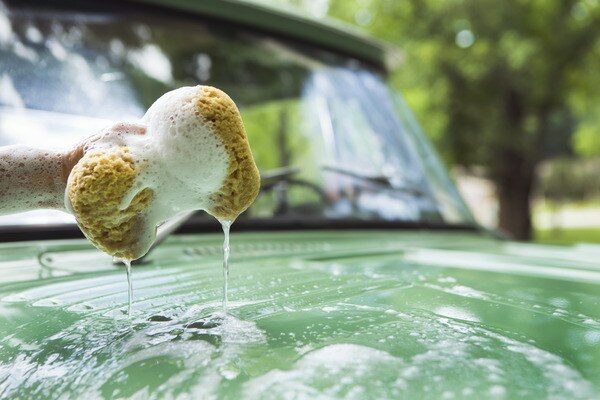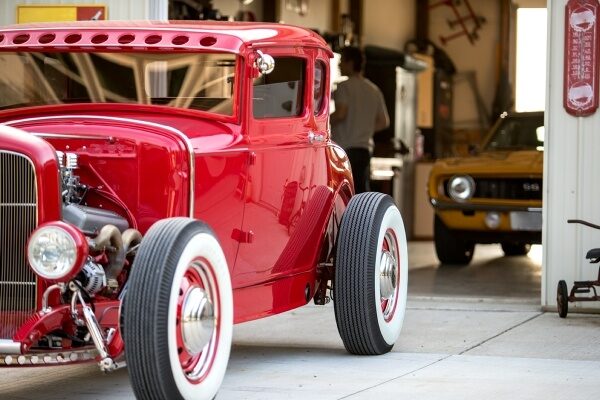
Classic Car Swap Meet Guide from Hagerty
Whether you call them swap meets, flea markets or auto jumbles (the British term) any gathering of folks wanting to buy and sell cars, parts, collectibles and related materials is a place that serious collectors will go. Even with the rise of the Internet, flea markets remain a major source of commerce for all collectors.
These markets started out as informal gatherings of collectors looking to clean out their garages or “swap” parts with other collectors who may have something they needed or wanted more. The natural place for such gatherings to occur was at car shows and many of the early markets were associated with major car shows. Perhaps the granddad of all car show-associated swap meets is the National Fall meet of the Antique Automobile Club of America in Hershey, Pennsylvania, or simply known to millions as the Hershey car show. That flea market has more than 8,000 vendor spaces and over 20 miles of aisles. But the rise of such huge markets created the opportunity for stand-alone events such as those that occur at the Carlisle Fairgrounds also in Pennsylvania. No matter which type of event you go to and where it happens, there are certain tricks of the trade to successful buying and selling.
Selling at classic car swap meets
Selling used to be an informal affair with vendors throwing the parts for sale on the ground and having potential buyers pick through them. As the industry grew, purchasers, and thereby vendors, became more sophisticated. This has forced even the little guy wanting to clean out his garage to make a greater effort. Here are some tips sell successfully at a swap meet:
Cleaned parts, without gobs of grease clinging to them, laid out on tables with clear tags identifying the item is now almost required if you want to attract customers.
Clearly marked prices help weed out the window shoppers, but many vendors still prefer not to mark the prices in an effort to force buyers to ask. The thinking behind this is to start a dialog with the potential buyer and sell them the part.
Beyond attempting to make a good presentation of the items you want to sell, the next most important trade issue is to know how to get paid. Flea markets are an example of what economists call the underground economy. Business is almost always done in cash with no paper trail. Yes, the major vendors who have regular businesses may accept checks and take credit cards, but the vast majority will accept only U.S. currency or, in many cases, travelers checks. The obvious skill to learn if you want to be a vendor is how to recognize bogus currency. This information is available online from the U.S. Department of the Treasury and the U.S. Secret Service at Know Your Money.
Another important skill for sellers to learn is to know how to price their wares and how to make sure they close the sale. It never ceases to amaze me how many vendors have an item that should sell but they over price it either out of stubbornness, greed or misinformation. The dynamics are simple. In most cases, if you have an item for sale, you have it priced fairly and there is a market for that item, it will sell. If it doesn’t sell than you have it over priced or are not reaching the market. My theory has always been that giving up a few dollars today may result in space or money for a better purchase tomorrow.
Buying at auto swap meets
Buying at meets requires a little more preparation and stamina than sitting with your latest issue of Hemmings or scanning the Internet. The advantage to “shopping the swaps” is the chance to find that rare item someone has and doesn’t recognize or that’s so specialized, it’s unlikely to be advertised.
Here are some recommended steps for successful flea market hunting:
- Carry a comprehensive list of everything you’re looking for. If you’re undertaking a restoration project, make sure you have a detailed plan on what you need as well as your budget.
- Have part numbers, interchange data and drawings, or photos of the parts or items you need with you to make on-the-spot identification possible. As a buyer, you have an advantage when you can identify an item that the seller can’t.
- Carry enough money to make your purchases. Some of the larger events have ATM machines and cash-checking services on the grounds but most don’t, so come prepared.
- Bring comfortable walking shoes, rain gear, an oversized bag for your potential purchases and a pair of gloves in case you buy a dirty or big item.
Classic car swap meet purchasing skills
Three necessary skills for swap meet purchasers are:
- Spotting what you want in a sea of similar items. You must be able to recognize what you’re searching for to know to stop and check your notes. This is where having part numbers, drawings and photos handy comes into play. Also, don’t forget to look under tables, in boxes and behind other objects as the item you need or want is often the one that isn’t immediately out front for all to see.
- Negotiating to purchase something in a flea market is as much an art as a science. Some vendors will have a price and not accept any negotiating, but most expect to do some haggling. Don’t get too caught up in negotiating and turn the purchase into a match of wills that potentially costs you something you need. Sometimes vendors will refuse to sell something after being offended by ridiculous offers or insults used by buyers in an attempt to get the price lowered.
- Knowing when to say yes or no, and living with it, is the final skill a buyer must possess. With negotiating, you have to know when to make the purchase and when to walk away. There’s nothing worse than making a purchase and finding a better item a few feet away for less money, or the alternative of leaving a good deal lay because the seller wouldn’t lower his price. Make your decision and move on.
Lastly, there’s the issue of paying for your purchases. As mentioned earlier, cash is the preferred method. But, many a purchaser and vendor trade in traveler’s checks. Sticking with the major brands such as American Express can provide some protection against counterfeit checks and loss. Traveler’s checks can always be exchanged for cash at a bank if more shopping capital is needed.
Some common sense about personal security applies to the flea markets: Break up your shopping money and put it into different pockets. Don’t flash wads of bills and talk out loud about amounts you’re carrying. Traveling with a friend or two always adds to your personal security – and makes for extra hands when making a big purchase.
Flea markets will continue to be a major component of the collector world and although the Internet has impacted the markets, it’ll never completely replace them. Exploring auto swap meets can be a great way to find needed parts, collectibles or memorabilia, all while sharing experiences with fellow car enthusiasts.



